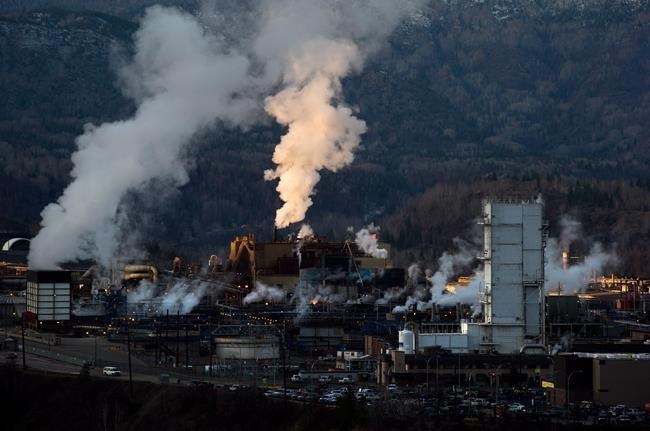Teck Resources Ltd. saw profits fall by 165 per cent last quarter as the COVID-19 pandemic dented demand for its commodities and slashed prices.
The second quarter yielded a loss of $149 million for the Vancouver-based miner, which was forced to shut down operations and halt construction at some sites.
All mines are now producing, and the company has issued an updated guidance after suspending it in April.
The forecast states that coal, copper, zinc and crude oil production in the second half of 2020 will reach volumes at or close to pre-pandemic predictions as industry ramps back up following lockdown closures.
"The COVID-19 pandemic obviously had a significant negative impact on business in the quarter. While all of our operations are currently producing with comprehensive virus-prevention measures in place, the economic impacts of the pandemic have reduced demand and prices for our products," CEO Don Lindsay said on a conference call.
Year-over-year prices for steelmaking coal, zinc and bitumen dropped 37 per cent, 29 per cent and 73 per cent, respectively, in the quarter ended June 30, Teck said. Copper output took a 12 per cent hit.
Construction of the US$5.2-billion Quebrada Blanca Phase 2 copper mine expansion in Chile dragged to a near standstill in the spring. Teck cut the workforce to 400, but the site now boasts 3,400 employees with the goal of reaching "full strength by October," or 8,000 workers, Lindsay said.
The project — key to the company's shift toward copper, which is used increasingly in electric vehicles, clean power plants and transmission lines — will see a half-year delay due to the COVID-19 interruption, with first production now slated for the end of 2022, he said.
Teck has also suspended operations at the Neptune bulk terminal in North Vancouver for five months starting in May. Construction on an upgrade to enhance capacity at the terminal will wind down in early 2021, with projected costs ballooning to up to $800 million from $400 million amid various delays.
The company incurred $260 million costs tied to the pandemic, more than half of which related to suspending construction at the Quebrada Blanca facility, said chief financial officer Ron Millos. Some $18 million more stemmed from a temporary shutdown at the Antamina copper and zinc mine in Peru as well as coronavirus fund donations.
Impala Asset Management, a New York-based investment firm and Teck shareholder, commended the company's response to the pandemic but criticized past decisions to delve into the Alberta oilsands and indulge heavy coal expenditures.
"The oilsands has been a disaster. It would have never happened had Don as the CEO not fully supported it," said Impala founder Bob Bishop, citing hundreds of millions of dollars in losses.
Teck's energy business includes a 21.3 per cent interest in the Fort Hills oilsands mine, which is majority owned by Suncor Energy Inc. The operation posted a $10-million profit last year with losses of $165 million in 2018 and $218 million in the first half of 2020.
In February Teck opted to withdraw from its Frontier oilsands project, which it owned entirely, posting a non-cash impairment of $1.13 billion.
Coal is more promising, but still a problem for the mining outfit, Bishop said.
"Your coking coal is kind of your flagship and you don’t let your flagship costs go the wrong way. And they have. And that’s on this management and that’s on this board," he said.
Teck's coal costs have risen to $105 per tonne from $67 per tonne in 2005, when Lindsay took over as CEO.
The company said it is carrying out a cost-cutting strategy for steelmaking coal and expects "the adjusted site cash cost of sales to drop below $60 per tonne" by the end of the year.
On Fort Hills, Teck reiterated that selling off its stake in the oilsands venture remains a real possibility.
"We have been very clear that if we can't see the value reflected in our share price, we will not hesitate to pursue other options for realizing value, including divestment at the appropriate time," the company said in an email.
The company said it cut about $250 million in operating costs and $430 million in capital costs to date from expected spending contemplated at the end of last June.
On Thursday, Teck reported revenues of $1.72 billion, down 45 per cent from $3.1 billion in the second quarter of 2019.
Its quarterly loss amounted to 28 cents per share, compared with a 41 cents per share or $231-million profit a year earlier.
Excluding one-time items, Teck's adjusted profit fell to $89 million or 17 cents per share, down from $498 million or 88 cents per share in the prior year quarter.
The company was expected to report a three cents per share loss and 10 cents per share adjusted loss on $1.7 billion of revenues, according to financial markets data firm Refinitiv.
Teck's shares gained 91 cents or 6.3 per cent at $15.41 in afternoon trading on the Toronto Stock Exchange.
This report by The Canadian Press was first published July 23, 2020.
Companies in this story: (TSX:TECK.B, TSX:SU)
Christopher Reynolds, The Canadian Press



